Important Distinctions for Highly Sensitive People and Survivors
The Academic Advantage of Highly Sensitive People
Highly sensitive individuals often excel in academic settings, benefiting from the structured guidance of syllabi and specific study directives from teachers. This structured approach offers a clear path to follow, aiding in navigating the academic environment. Throughout my years working with therapy and coaching clients, I've emphasized that life doesn't offer such clear instructions. Unlike a school syllabus, life's lessons are not laid out for us; we must discern them as we journey through life. Many, including those from my generation who graduated high school around 1998, feel inadequately prepared for adult life, lacking essential life skills. My aim through this show is to support those on a path of self-discovery, the 'Seekers', in cultivating peace, ease, and joy in their lives. For parents, it's crucial to intentionally prepare children for the challenges of adulthood.
Embracing Life's Challenges: Opportunities for Growth
Today, I want to share insights particularly useful for highly sensitive people and those in recovery or self-development. Life doesn't come with a manual or set study guide. We learn and grow through the very act of living, akin to a baby learning to walk. Feeling uncertain or 'wobbly' in life, recovery, or personal growth isn't a sign of failure, but a natural part of the journey. Embracing this process, we develop emotional resilience and maturity, eventually moving from emotional 'walking' to 'running'.
I advocate approaching life with a belief that experiences happen for us, not to us, presenting opportunities for growth. Faced with life's challenges, we can react with resistance and frustration or choose acceptance and learning. Each experience is a lesson, often understood only in hindsight. Recognizing our power to respond to life's challenges with curiosity and grace rather than resistance can profoundly change our approach to life.
Help vs. Enabling: The Fine Line in Support
An important distinction for highly sensitive individuals is understanding the difference between help and enabling. In many dysfunctional family dynamics, this line is blurred. True help is assistance that empowers the other person, whereas enabling prevents them from developing their capabilities. For example, in parenting, there's a fine line between assisting a child with homework and doing it for them, which would be enabling. Enabling denies the child the opportunity to develop problem-solving skills and resilience. Similarly, in codependency recovery, it's vital to discern between healthy assistance and over-functioning that hinders others' growth. Recognizing and respecting healthy struggles in others, and in ourselves, is crucial for genuine development and self-esteem.
The Power of Completing Challenges: Boosting Self-Esteem
Completing a challenging task often brings a sense of achievement and boosts self-esteem, reinforcing the belief in our abilities. This feeling of accomplishment is life-affirming and contributes to our personal growth. However, by stepping in to ease discomforts, such as doing a child's chores or homework, we inadvertently deprive them of the opportunity to build self-worth and resilience. These life skills are crucial for enduring and overcoming life's challenges.
Recognizing Dysfunctional Dynamics: Help or Hindrance?
In families where addiction is present or where there's an imbalance of responsibility, distinguishing between help and enabling becomes complex. A key indicator of this dynamic is the presence of resentful 'helpers' who feel burdened by their actions. In such cases, understanding the difference between genuine assistance and enabling is crucial. Before offering help, it's important to ask if it's wanted or needed, ensuring that the assistance is actually beneficial and not a reflection of our own need to feel needed.
Discernment vs. Judgment: Making Informed Decisions
This leads to exploring another important distinction: judgment versus discernment and confidence versus arrogance. In our society, judgment is often seen negatively, but discernment is a necessary skill for making informed decisions. Ego, too, is often viewed unfavorably, but a healthy ego is essential for self-respect and resilience, especially for survivors of trauma or abuse. Building ego strength is not about becoming narcissistic but about valuing oneself and asserting one's worth.
Understanding these distinctions is vital for personal growth and healthy relationships. We need to recognize when we are truly helping versus when we are enabling, and learn to differentiate between healthy self-esteem and arrogance. This awareness helps us navigate life more effectively, fostering resilience and self-respect in ourselves and others.
Discernment is a crucial skill, especially in spiritual and personal growth. It involves perceiving and understanding situations without judgment. It's important to give ourselves the freedom to discern in various aspects of our lives, from our inner self-talk to our interpersonal relationships. For instance, in my personal life, I practice discernment without judgment by evaluating the level of drama new acquaintances might bring into my life. My aim is to maintain peace and purpose, so I distinguish between drama that is a natural part of life and drama that is self-created. This discernment helps me set boundaries and maintain my energy for my work as a trauma therapist and life coach.
This brings us to the distinction between confidence and arrogance. It's vital to understand this difference, especially for highly sensitive individuals who often fear appearing arrogant. Many hold back from acknowledging their accomplishments or feeling proud, worried about being perceived as overbearing. However, there's a significant difference between healthy self-confidence and arrogance. Confidence is about acknowledging and owning your abilities and growth, while arrogance involves an exaggerated sense of self-importance.
Confidence vs. Arrogance: Navigating the Fine Line
Many highly sensitive people, survivors, and seekers fear stepping into their confidence, mistaking it for arrogance. But embracing confidence is crucial for personal growth and self-esteem. It's about recognizing your strengths and gifts without diminishing others. This self-acknowledgment is not only healthy but necessary.
This episode highlights the importance of distinguishing between helping and enabling, discernment and judgment, and confidence and arrogance. Understanding these distinctions can significantly enhance your emotional intelligence and overall personal growth.
Episode Tags
- ADD 1
- Abuse 17
- Alcohol 3
- Anger 11
- Archetypes 1
- Bullying 6
- Childhood 37
- Codependency 10
- Covid 4
- Crystal Catalina 4
- Depression 15
- Detachment 2
- Disassociation 4
- Emotions 75
- Existentialism 2
- Faith 1
- Family 28
- Fatigue 4
- Focus 3
- Gratitude 11
- Grief 14
- Guilt 2
- Healers 7
- Healing 52
- High Sensation 4
- Hope 1
- Hypervigilance 7
- Introverts 6
- Lonliness 9
- Love 3
- Manifesting 5
- Manipulation 20
- Masculinity 1
- Men 1
- Mindfulness 39
- Money 10
- Music 3
- Nutrition 2
- Overthinking 8
- PTSD 13
- Parenting 12
- People Pleasing 9
- Perfectionism 6
- Pets 4
- Relationships 21
- Resiliency 14
- Sadness 1
- Self Esteem 19
- Self Love 11
- Self Respect 1
Upcoming Events
Episode Tags
- ADD 1
- Abuse 17
- Alcohol 3
- Anger 11
- Archetypes 1
- Bullying 6
- Childhood 37
- Codependency 10
- Covid 4
- Crystal Catalina 4
- Depression 15
- Detachment 2
- Disassociation 4
- Emotions 75
- Existentialism 2
- Faith 1
- Family 28
- Fatigue 4
- Focus 3
- Gratitude 11
- Grief 14
- Guilt 2
- Healers 7
- Healing 52
- High Sensation 4
- Hope 1
- Hypervigilance 7
- Introverts 6
- Lonliness 9
- Love 3
- Manifesting 5
- Manipulation 20
- Masculinity 1
- Men 1
- Mindfulness 39
- Money 10
- Music 3
- Nutrition 2
- Overthinking 8
- PTSD 13
- Parenting 12
- People Pleasing 9
- Perfectionism 6
- Pets 4
- Relationships 21
- Resiliency 14
- Sadness 1
- Self Esteem 19
- Self Love 11
- Self Respect 1




















